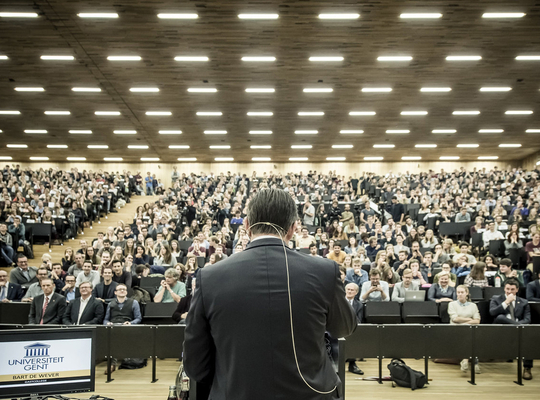You are here
Bart De Wever: “Greater realism is required in dealing with the refugee crisis”

During the opening speech for the Political Sciences programme at Ghent University, guest speaker and N-VA chairman Bart De Wever took a good hour to thoroughly analyse the European refugee crisis. At the same time, he offered specific solutions for dealing with the crisis in a realistic and reasonable manner. De Wever noted that “because Europe is currently trapped in a moral and legal straightjacket, we cannot take all of the necessary measures. But can we at least already start thinking about it?”
“The Middle East is a powder keg that has exploded, which has brought about a true exodus from the region,” began De Wever’s analysis. In this regard, refugees continue to look for the path of least resistance and the most attractive option. This inevitably leads them to Europe. A Europe that has gone far too long without a geopolitical compass to guide it, and which has become hopelessly divided within. But especially a Europe that today has left its gates wide open. “The principle of Schengen is that if the outer borders are controlled, then internal border control is no longer needed. But Greece no longer controls our borders. Because of this, Schengen is de facto no longer in existence,” regretted De Wever.
Economic compass
In the meantime, refugees are walking through Europe using an economic compass; a fact that hasn’t escaped the notice of many European citizens. “You are a war refugee when you leave an unsafe war zone and arrive at the first place where you find stability, peace and safety. When you travel on for several thousand kilometres more, then you are no longer a war refugee. You are then an economic refugee,” said De Wever. “We cannot delude ourselves or talk ourselves into thinking that all these people are fleeing war.”
War of opinions
In that respect, the N-VA chairman also referred to the war of information that is raging now, with the intention of garnering public support for a solidarity-based approach. In this context he also referred to the now world-famous picture of Aylan, the young boy who washed up on a beach in Bodrum. “The real story of what happened to Aylan has been lost. There is too much disinformation. And instead of clarifying things, the media themselves have contributed to the confusion. You mostly see this response on social media, where every narrative evokes a counter-narrative.”
Cultural sense of unease
This doesn’t put public opinion at ease, quite the opposite. “There is a feeling of unease permeating public opinion,” notes De Wever. “It’s almost an existential fear: can Europe handle this?” The biggest source of unease in this regard, according to him, isn’t material, but rather cultural. “The past failures of integration policy make people fear for the worst when it comes to the consequences of this uncontrolled mass migration on our cultural and social fabric. After all, integration means that you adapt to the universal values of the Enlightenment. Europe must have the courage to propose these principles of Enlightenment as a compass for an inclusive policy on identity and citizenship. That is the only way to maintain our tolerance and safeguard a future with freedom and prosperity for everyone,” was De Wever’s parting advice for our European policymakers.

